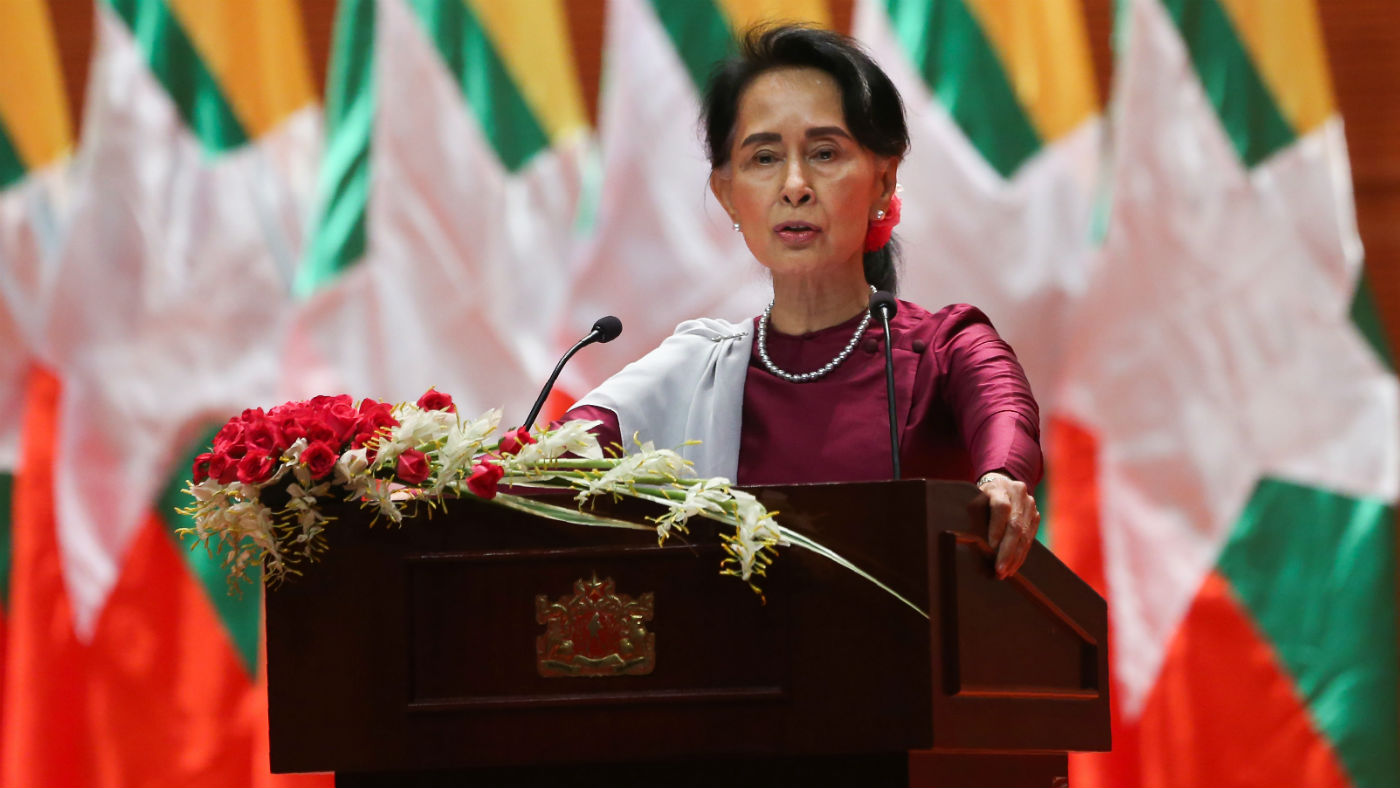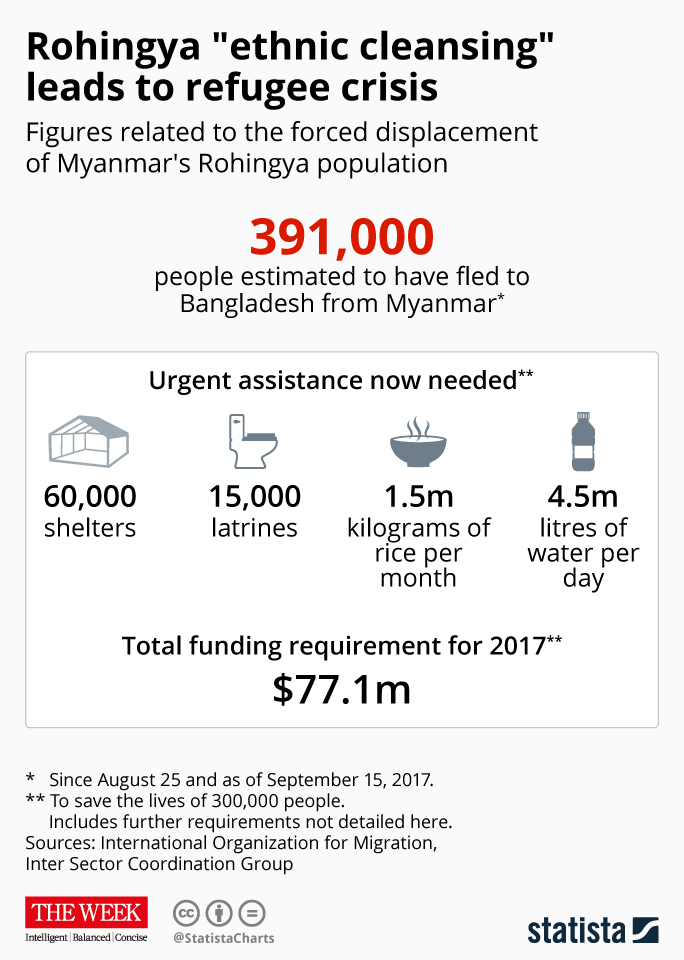Aung San Suu Kyi: Myanmar ‘does not fear world scrutiny’
Nobel Peace Prize winner accused of ‘burying head in the sand’ over Rohingya crisis

A free daily email with the biggest news stories of the day – and the best features from TheWeek.com
You are now subscribed
Your newsletter sign-up was successful
Aung San Suu Kyi has broken her silence on the Rohingya crisis in Myanmar, saying her government “does not fear international scrutiny”.
Suu Kyi, the country’s de facto leader, has come under growing criticism for her failure to speak out about the bloody army crackdown on the Muslim minority in Rakhine state.
Earlier today, Marzuki Darusman, head of a UN investigation into violence in Myanmar, asked his UN superiors for more time to look into allegations of mass killings of Rohingya men, women and children, as well as torture, sexual violence and the burning of villages, reports Reuters.
The Week
Escape your echo chamber. Get the facts behind the news, plus analysis from multiple perspectives.

Sign up for The Week's Free Newsletters
From our morning news briefing to a weekly Good News Newsletter, get the best of The Week delivered directly to your inbox.
From our morning news briefing to a weekly Good News Newsletter, get the best of The Week delivered directly to your inbox.
Darusman is hopeful that he may soon get Myanmar’s permission to enter the Buddhist-majority country, where more than 1,000 Rohingya are reported to have been killed since 25 August, when militants attacked government forces. At least 400,000 Rohingya have fled to neighbouring Bangladesh, according to the UN.

Giving her first public address about the violence, in Myanmar’s parliament yesterday, Suu Kyi failed to directly address the claims and instead condemned “all human rights violations and unlawful violence”.
She continued: “We are committed to the restoration of peace and stability and rule of law throughout the state.”
Suu Kyi said that “more than 50%” of Rohingya villages were “intact”, and invited diplomats and foreign observers to visit those communities in order to “learn more from the Muslims who have integrated successfully” into the state.
A free daily email with the biggest news stories of the day – and the best features from TheWeek.com
“Myanmar does not fear international scrutiny,” she added.
Amnesty International accused the Noble Peace Prize winner and her government of “burying their heads in the sand over the horrors unfolding in Rakhine state”.
“At times, her speech amounted to little more than a mix of untruths and victim blaming,” said James Gomez, the charity’s regional director for Southeast Asia and the Pacific.
“Aung San Suu Kyi’s claims that her government ‘does not fear international scrutiny’ ring hollow,” he added. “If Myanmar has nothing to hide, it should allow UN investigators into the country, including Rakhine state.”
The UN’s High Commissioner for Human Rights, Zeid Ra’ad al-Hussein, last week told the UN Human Rights Council in Geneva that the situation “seems a textbook example of ethnic cleansing”.
-
 Switzerland could vote to cap its population
Switzerland could vote to cap its populationUnder the Radar Swiss People’s Party proposes referendum on radical anti-immigration measure to limit residents to 10 million
-
 Political cartoons for February 15
Political cartoons for February 15Cartoons Sunday's political cartoons include political ventriloquism, Europe in the middle, and more
-
 The broken water companies failing England and Wales
The broken water companies failing England and WalesExplainer With rising bills, deteriorating river health and a lack of investment, regulators face an uphill battle to stabilise the industry
-
 Epstein files topple law CEO, roil UK government
Epstein files topple law CEO, roil UK governmentSpeed Read Peter Mandelson, Britain’s former ambassador to the US, is caught up in the scandal
-
 Iran and US prepare to meet after skirmishes
Iran and US prepare to meet after skirmishesSpeed Read The incident comes amid heightened tensions in the Middle East
-
 Israel retrieves final hostage’s body from Gaza
Israel retrieves final hostage’s body from GazaSpeed Read The 24-year-old police officer was killed during the initial Hamas attack
-
 China’s Xi targets top general in growing purge
China’s Xi targets top general in growing purgeSpeed Read Zhang Youxia is being investigated over ‘grave violations’ of the law
-
 Panama and Canada are negotiating over a crucial copper mine
Panama and Canada are negotiating over a crucial copper mineIn the Spotlight Panama is set to make a final decision on the mine this summer
-
 Why Greenland’s natural resources are nearly impossible to mine
Why Greenland’s natural resources are nearly impossible to mineThe Explainer The country’s natural landscape makes the task extremely difficult
-
 Iran cuts internet as protests escalate
Iran cuts internet as protests escalateSpeed Reada Government buildings across the country have been set on fire
-
 US nabs ‘shadow’ tanker claimed by Russia
US nabs ‘shadow’ tanker claimed by RussiaSpeed Read The ship was one of two vessels seized by the US military